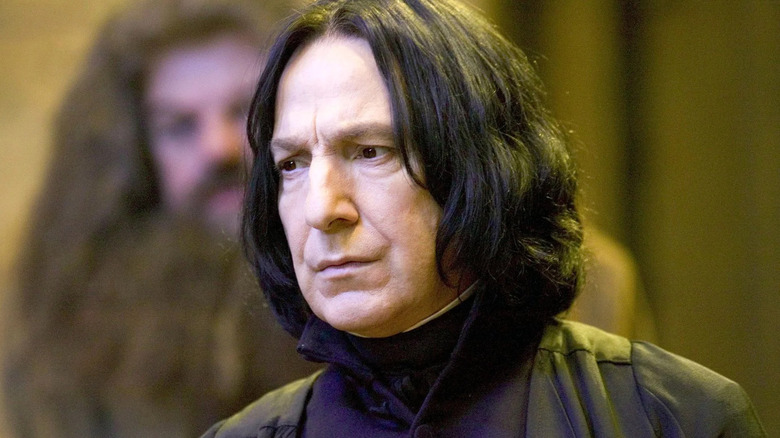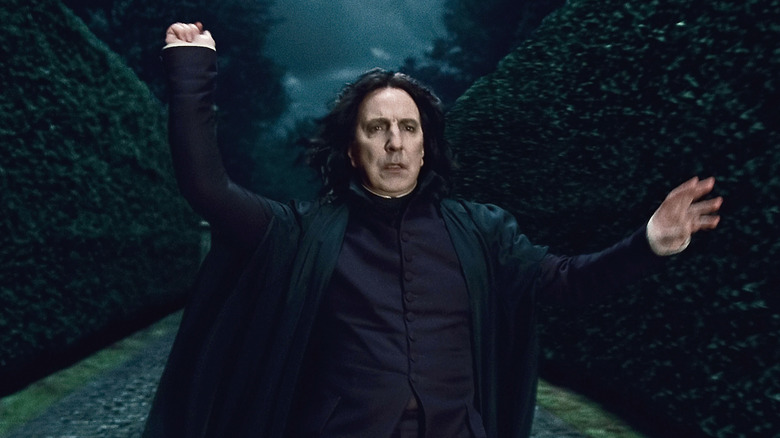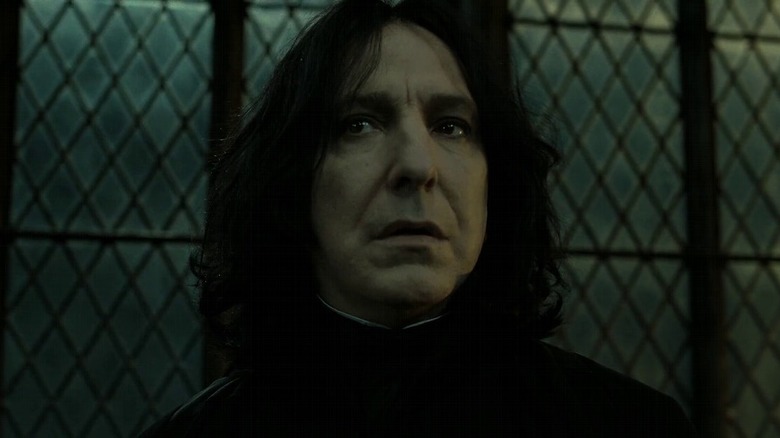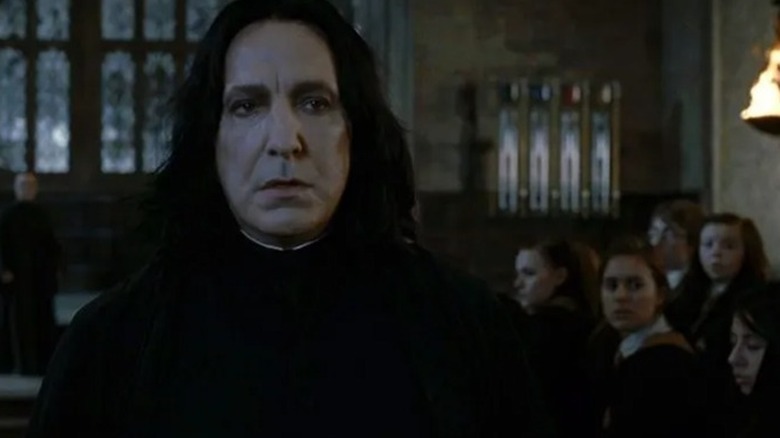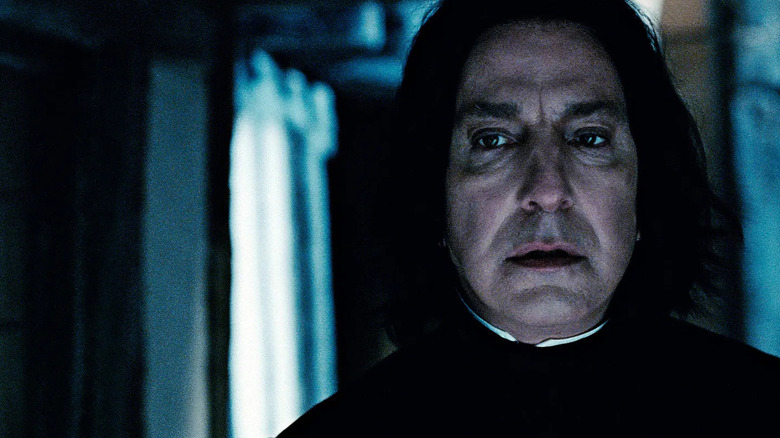Why Did Snape Kill Dumbledore In Harry Potter And The Half-Blood Prince?
Of all the many, many characters in "Harry Potter," few are more complicated than Severus Snape, played in the film franchise by the late, great Alan Rickman. I Throughout the books and films, he's a constant thorn in Harry's (Daniel Radcliffe) side, basically just taking every possible opportunity to be mean to a literal child for reasons nobody completely understands at first. It seems, at face value, like Snape is just capital-E evil, akin to Voldemort (Ralph Fiennes) or even Dolores Umbridge (Imelda Staunton) — especially when, in "Harry Potter and the Half-Blood Prince," he kills Albus Dumbledore (Michael Gambon).
(Sorry for the decades-old spoiler.)
At the end of the book, Harry and Dumbledore return from hunting for one of Voldemort's Horcruxes — a horrible magical object containing a piece of a wizard's soul that can only be created through murder — only to find that the Dark Lord's Death Eaters have invaded Hogwarts School of Witchcraft and Wizardry. Dumbledore and Harry find themselves at the top of one of the castle's massive tower when Harry's Slytherin classmate, Draco Malfoy (Tom Felton), tries to kill the headmaster, only to lose his nerve. That's when Snape shows up and Dumbledore says just one sentence to his longtime colleague: "Severus, please."
With a flash of green light, Dumbledore is dead at Snape's hands, and Harry is livid. As it turns out, there's a lot more to the story than you'd think; Dumbledore and Snape had a deal, and the older wizard asked his friend and double agent to kill him when the time came.
So Snape was a good guy all along?
Kind of! See, despite committing apparent murder in cold blood, Snape and Dumbledore had a plan the whole time. As Harry later learns from the Potions master's memories, Dumbledore incurred a serious and fatal injury from a cursed ring while hunting for a different Horcrux, and he was going to die soon anyway. Dumbledore also knew, thanks to Snape serving as a double agent — pretending to be a trusted Death Eater but really working for Dumbledore, to be specific — that Malfoy was asked by Voldemort personally to kill the headmaster. Knowing a teenager probably would balk at murdering an old man and also knowing that Voldemort would kill Malfoy if the boy failed, Dumbledore plainly tells Snape, "you must kill me."
Snape responds in, well, a very Snape fashion: ""Would you like me to do it now? Or would you like a few moments to compose an epitaph?" Ultimately, as Dumbledore points out, since Snape is the only person who knows that Dumbledore is sick, he'll spare Malfoy from the pain of committing murder as well as grant an old, dying man a dignified death. Harry finds all of this out later from Snape's memories, but in the moment, he vows revenge after watching Snape kill Dumbledore — not knowing that he shares a bond with Snape that's been there all along.
Snape has a special connection to Harry, in a way
It's pretty simple: Snape was always in love with Harry's mother Lily. The two were neighbors growing up, and when it turned out Lily had magical ability, they went to Hogwarts at the same time. When they got there, though, Snape was sorted into Slytherin and Lily into Gryffindor, tearing the two friends apart — and the divide between them only grew as time went on. When Lily started hanging out with James, Harry's eventual father, and his friends — who all hated and bullied Snape — the friendship fell apart, with Snape ultimately joining the Death Eaters after they left school.
Snape never stopped loving Lily, though. It's notable that he's the only Death Eater who can summon a Patronus, a charm based in happiness and joy that can ward off dementors... and his Patronus is a doe, representing Lily. It's because of Lily and Harry, in fact, that he turns on Voldemort and becomes a double agent for Dumbledore. After passing information to the Dark Lord that led to Voldemort trying to kill Harry and successfully killing Lily and James, Snape vows to keep Lily's son safe, which he does for the rest of his life.
Snape is instrumental in helping Harry until the very end
After the events of "Half-Blood Prince," Harry simply hates Snape, still believing he murdered Dumbledore and not knowing the two men had a deal. It's not until the end of "Deathly Hallows" that it's revealed that Snape was actually helping Harry the entire time while Harry, Ron (Rupert Grint), and Hermione (Emma Watson) hunted for the remainder of Voldemort's Horcruxes, which have to be destroyed before the Dark Lord can be defeated.
It's Snape's Patronus that leads Harry to a secluded, icy pool deep in a random forest where Snape has secretly placed the Sword of Gryffindor, an extremely rare weapon that can destroy Horcruxes (thanks to the fact that it's imbued with basilisk venom, which refers back to another story from a different "Potter" book, "Chamber of Secrets"). Without the sword, Harry would never be able to destroy any of them, so Snape's actions are instrumental to the task at hand. When it's time for Harry to learn the full truth, including that he has to let Voldemort kill him in order to destroy the Horcrux that lives in him, it's through Snape's memories after the man dies in front of Harry, mauled by Voldemort's snake Nagini.
Still, Snape is an extremely divisive character, even after all these years
With all of that said, there's no denying that Snape is a divisive character within the "Harry Potter" fandom at large. Yes, he makes sacrifices and is at constant personal risk, all to protect Harry and fight against Voldemort — but he's also extremely mean to children all of the time, to the point where you have to wonder why he chose to be a teacher at all. Sure, he's nice to the Slytherin kids, but he's downright abusive to Gryffindors, especially Harry, Ron, Hermione, and poor Neville Longbottom (Matthew Lewis), who, at one point, describes Snape as the thing he fears most in the world.
Beyond that, Snape's lifelong obsession with Lily, a woman who didn't love him back and was happily married to a different guy, can rub fans the wrong way; it has huge "friendzone" energy when you really think about it, and it's also just a little bit creepy. Being obsessed with a dead, taken woman isn't a great look, but despite all of these apparent red flags, Snape is beloved by a huge faction of "Potter" fans, and Harry himself seems to agree. During the epilogue of "Deathly Hallows," it's revealed that Harry named one of his sons Albus Severus (poor kid), noting that one of them, meaning Snape, was "probably the bravest man [he] ever knew." (Albus Severus goes on to be the main character of the stage play "Harry Potter and the Cursed Child," but the less said about that, the better.
Snape might seem like a villain, but at the end of the day, he was always fighting for the right cause — even if his attitude could use some work. Yes, he killed Dumbledore, but he had a reason... and strangely enough, it was a good, even virtuous one.
